My dear friend Paul Fine just sent me two photos from our college graduation in 1985. The first one shows me with my mother, the second shows me with Paul:
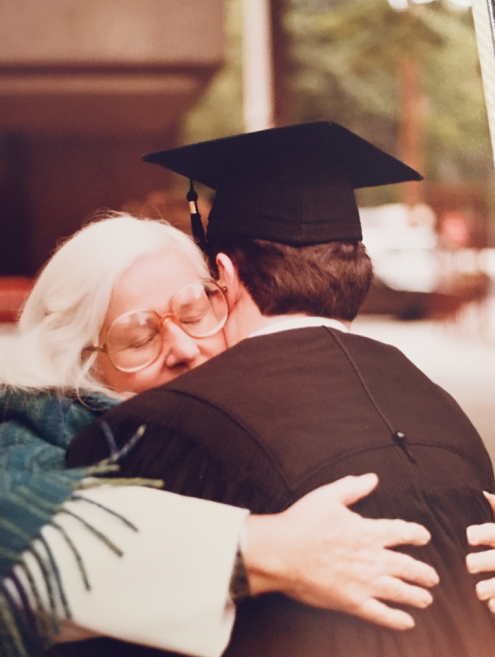

My dear friend Paul Fine just sent me two photos from our college graduation in 1985. The first one shows me with my mother, the second shows me with Paul:


I’ve written previously about my late mother (see here and here), and there is much more to say if I ever have the time. But today, in honour of Father’s Day, I thought I’d say a little about my father.
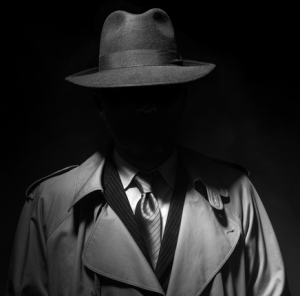
And a little is all there is to say. I don’t remember him; I don’t even have a photo of him (all photos were lost in a move – the reason that, ever after, my mother and I always took family photos with us in the car when we moved, rather than entrusting them to movers). He was raised in an orphanage, with no living relatives; I gather he did know the names of his deceased parents, but my mother didn’t know or didn’t remember. In fact my mother knew fairly little about him, but figured she’d have years ahead to find out. All I know about him is what I remember from my mother’s stories, which isn’t much, since in her later years the focus of her reminiscences slid back more and more to her childhood.
My father, Phillip (or Philip?) Patrick Long, was born on, I believe, 11 November 1922, in, I believe, Kansas. He was of Irish and Czech ancestry – on, I believe, his father’s and mother’s side respectively. The cause of his parents’ early deaths I do not know. He served in World War II, in the European theatre. He disapproved of fellow soldiers who came back with trophies from Germany, calling it stealing.
He attended either the University of Kansas or Kansas State University, but whether before the war, or after, or both, I’m not sure. Later he worked as a business consultant and efficiency expert, as well as in “oil sales,” whatever that is exactly. He met my mother at a party in, I believe, Newport Beach (I’m not sure of the year), though they didn’t get involved immediately.
He was very bright, with many interests – he taught my mother the phrase “spacetime continuum” (in what context I don’t know) which she in turn taught me at an early age. When he proposed to my mother, he did so in what she described as a cautious, abstract, intellectual way: “If person A and person B,” something something. But despite how that might sound they were wildly in love. I don’t know what year they married either; perhaps 1962? My mother always wore the unusual wedding ring he gave her (it’s hard to describe – varied gold and silver relief patterns) until to her great distress it slipped unnoticed off her finger in a Kroger grocery in Opelika a few years before her death and she was unable to find it.
While not particularly athletic by nature, he tackled a number of sports, not out of enjoyment but to prove to himself that he could master them. He didn’t like the bother of owning a car and preferred to lease one; he laughed at the sentimentality of my mother’s growing emotionally attached to her car. He generally found my mother too sentimental, teasing her over her religious views, her involvement in causes like the Anti-Vivisection League, and the like. But in their political arguments she managed to convert him from New Deal Democrat to Goldwater Republican. When he’d had a successful business deal he would light his cigarette with a burning hundred dollar bill; my mother believed he did this only in the knowledge that she would frantically put out the flame – the bills always survived.
He occasionally had a certain facial expression that my mother always distrusted, one that she thought meant he was trying to con her. But years later, when she discovered that I sometimes had exactly the same expression, she decided that perhaps she’d been mistaken.
Despite not having much money, my parents both loved to travel and were very spontaneous; they kept a packed overnight bag in the car at all times so that they could suddenly head off into the California hills if the mood struck them.
My mother didn’t want him to meet her mother, knowing as she did her mother’s insidious way of undermining relationships. He just laughed: “I’m not afraid of her!” But in the event they never met. That was okay with him; he had no interest in my mother’s family or past – he was focused on the future. (“He’s black, isn’t he? That’s why you don’t want me to meet him!” was my grandmother’s characteristic reaction – the most dire possible explanation from her point of view.)
My mother wanted to try natural childbirth. “Absolutely not,” he insisted, for which she was later grateful (although she was in fact, like me, never much helped by anaesthetic). During my mother’s pregnancy he kept putting off an important business trip until after the projected birth date, which kept getting later and later as I failed to make my appearance. Finally he could delay no longer, and so wasn’t in town when I was born; but he returned immediately once he got the news. When he visited the hospital, my mother was slightly miffed that he went to see me first before seeing her.
He hadn’t expected to enjoy fatherhood but to his surprise was crazy about me, enjoyed holding me and feeding me and playing with me. “If this kid grows up with your beauty and my brains he’ll be unstoppable,” he teased her. (As if.)
My father was away frequently on business trips about which my mother knew little. Finally, when I was still a baby, there was the business trip from which he didn’t come back. She had no idea what had happened, and for a while believed he had abandoned her. (Her harrowing childhood had led her to be slow to trust, and always to expect betrayal.) Then someone vaguely connected with my father’s business belatedly informed her that he had died in a plane crash (charter, presumably) in Latin America. If they told her more, she didn’t remember the details by the time I thought to ask about them. In later years she suspected that he had secretly been in the CIA or something of the kind.
And that’s it. All I know, or can remember at the moment anyway, about my mysterious father.
June 16:
Fingerprints (1977):
Traveling Light (2016):
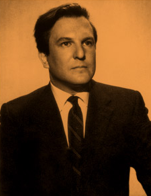
In June 1963, when Nathaniel Branden published a piece on “Inherited Wealth” in The Objectivist Newsletter, he was still the beloved disciple of Ayn Rand, who reprinted his piece in her 1966 collection Capitalism: The Unknown Ideal, and continued to include it in subsequent editions despite her break with Branden in 1968. As Rand famously did not allow opinions deviating even in the slightest from her own to appear in journals or books that she edited, we can assume Branden speaks for Rand when he writes:
A free, competitive economy is a constant process of improvement, innovation, progress; it does not tolerate stagnation. If an heir who lacks ability acquires a fortune and a great industrial establishment from his successful father, he will not be able to maintain it for long; he will not be equal to the competition. In a free economy, where bureaucrats and legislators would not have the power to sell or grant economic favors, all of the heir’s money would not be able to buy him protection for his incompetence; he would have to be good at his work or lose his customers to companies run by men of superior ability. There is nothing as vulnerable as a large, mismanaged company that competes with small, efficient ones. …
It is a mixed economy – such as the semi-socialist or semi-fascist variety we have today – that protects the nonproductive rich by freezing a society on a given level of development, by freezing people into classes and castes and making it increasingly more difficult for men to rise or fall or move from one caste to another; so that whoever inherited a fortune before the freeze, can keep it with little fear of competition, like an heir in a feudal society.
Here Branden, and by presumption Rand, are endorsing a crucial part of the left-libertarian idea of competition as a levelling force. The quotation makes an interesting pairing with a remark of Murray Rothbard’s in a 1966 letter:
For some time I have come to the conclusion that the grave deficiency in the current output and thinking of our libertarians and “classical liberals” is an enormous blind spot when it comes to big business. There is a tendency to worship Big Business per se … and a corollary tendency to fail to realize that while big business would indeed merit praise if they won that bigness on the purely free market, that in the contemporary world of total neo-mercantilism and what is essentially a neo-fascist “corporate state,” bigness is a priori highly suspect, because Big Business most likely got that way through an intricate and decisive network of subsidies, privileges, and direct and indirect grants of monopoly protection.
Yet if Rand, Branden, and Rothbard all accepted this crucial aspect of left-libertarian analysis, then a) where did Rothbard depart from Rand and Branden, and b) where did all three depart from left-libertarianism as we understand it today? (On the specific issue of economic inequality, I mean – not getting into the various other areas of disagreement.)
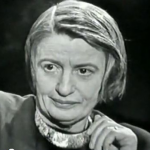
A crucial difference dividing Rothbard from Rand and Branden is that Rand and Branden do not seem to fully recognise the implication of their insight that under present circumstances the “unproductive rich” can maintain their position “with little fear of competition.” If they did, they’d have to agree with Rothbard that “bigness is a priori highly suspect” in the present-day economy, given the likelihood that it is the product of “subsidies, privileges, and direct and indirect grants of monopoly protection.” Rand, by contrast, famously declared big business a “persecuted minority,” a formulation ridiculed by Rothbard. While endorsing the premise that government controls insulate the rich from competition and make it difficult for newcomers to rise up, Rand fails to draw the logical conclusion that any firms that do manage to become enormously wealthy in the present-day economy are in most cases likely to have achieved their status at least in large part via government favoritism, and so are proper objects of suspicion, not celebration and defense.
Thus Rothbard is more consistent on this point than Rand and Branden, and so is closer to left-libertarianism. This is presumably in part because he had read and embraced the New Left historical discoveries, by thinkers like Gabriel Kolko, James Weinstein, and William Appleman Williams, of the actual historical role of big business in American history, showing that the Gilded Age magnates that Rand idolised were indeed mostly state-supported parasites too – discoveries that Rand never showed much interest in. (Later Randians eventually got around to discovering Kolko, and responded by going on the attack; see, e.g., here and here. A left-libertarian response to the contemporary Randian critique of Kolko is forthcoming in the Molinari Review.)
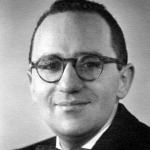
Where Rothbard parts company with left-libertarianism is that his suspicion of bigness is limited; while “in the contemporary world” vast concentrations of wealth are suspect, he writes that “big business would indeed merit praise if they won that bigness on the purely free market” – which seems to imply that he thinks enormous, systematic, pervasive, and longterm economic inequalities would indeed be possible in a free market – whereas left-libertarianism denies this, since it would be difficult to sustain such inequalities if producers were free to imitate what others were doing to become rich.
Of course there are differences in talent, as in Nozick’s “Wilt Chamberlain example,” that would serve as a bar to perfect imitation. But a glance at the wealthiest firms and individuals – in popular parlance, the “one percent,” a term actually coined by left-libertarian Karl Hess – shows the persistent role of government privilege in maintaining their status; they did not get there or stay there by talent alone.
In Man, Economy, and State, Rothbard does recognise that a single large firm dominating the entire economy would be impossible in a free market, owing to its insulation from market feedback:
In order to calculate the profits and losses of each branch, a firm must be able to refer its internal operations to external markets for each of the various factors and intermediate products. When any of these external markets disappears, because all are absorbed within the province of a single firm, calculability disappears, and there is no way for the firm rationally to allocate factors to that specific area. The more these limits are encroached upon, the greater and greater will be the sphere of irrationality, and the more difficult it will be to avoid losses. One big cartel would not be able rationally to allocate producers’ goods at all and hence could not avoid severe losses.
But Rothbard does not take the further step of recognising that insulation from market feedback is a matter of degree, so that in a free market diseconomies of scale would begin to kick in well before a single firm dominated the entire market. That is why left-libertarians expect a much flatter free-market landscape than the ones envisioned by Rand, Branden, and even Rothbard.
June 15:
That’s No Way to Say Goodbye (1967):
Here It Is (2001):
Random anecdote of the day:
When I was living in Hanover NH as a high school student (1977-1981), I ate frequently at Lou’s Restaurant on Main Street. At that time Lou’s had some very distinctive ceiling light fixtures. Judging from recent photos, they’ve since been replaced by more ordinary-looking ones (though I’m happy to see that the restaurant itself still exists, albeit under new ownership), but I managed to track down some photos of the original light fixtures, which apparently were around both well before and well after my time:
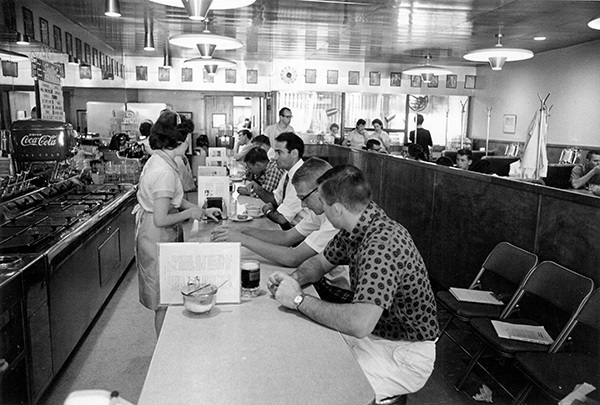
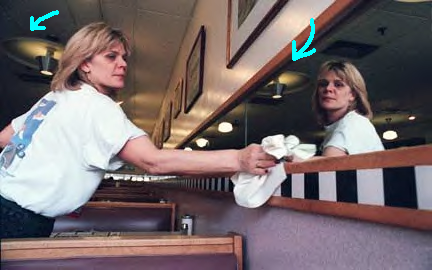
In those days I was writing a lengthy comic-book series (I’d started it at age 13 and was actually still working on it at age 28, though I’ve never since had time to return to it), and these light fixtures (or perhaps more precisely the shadows they cast, though the photos don’t show that) struck me as cool and eerie and alien-looking, and so they ended up in my comic, transformed into spaceships – specifically, the gigantic baseships of the evil Dantean Empire, which looked like this:

(The size ratio of the top part to the bottom part tended to vary a bit over time.)
I also made a three-minute animated film based on the comic for a high school film class, but I somehow never ended up with a copy of the film, and only the first half of it came out anyway. I still have all the drawings for it though, packed away somewhere.
| M | T | W | T | F | S | S |
|---|---|---|---|---|---|---|
| 1 | ||||||
| 2 | 3 | 4 | 5 | 6 | 7 | 8 |
| 9 | 10 | 11 | 12 | 13 | 14 | 15 |
| 16 | 17 | 18 | 19 | 20 | 21 | 22 |
| 23 | 24 | 25 | 26 | 27 | 28 | 29 |
| 30 | 31 | |||||